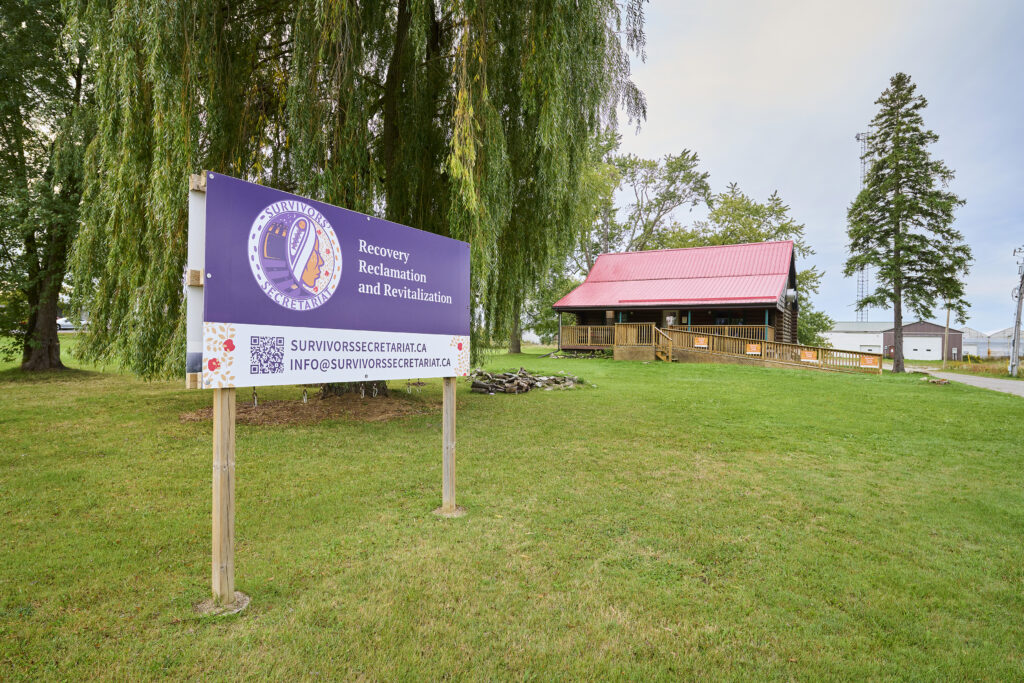Survivors’ Secretariat would like to take a moment to look back and reflect on the past year; a year filled with powerful moments, meaningful partnerships, and commitment to truth, justice, and healing.
The Survivors’ Secretariat has continued to walk alongside Survivors, families, and community members, to Bring the Children Home. Month by month, we’ve gathered, shared stories, searched sacred ground, advocated for systemic change, and stood in ceremony together. Whether hosting community events, attending national gatherings, or furthering our initiatives, every step we’ve taken has been guided by Survivors and grounded in our responsibility to the children.
The challenges we faced only strengthened our resolve and deepened our commitment to our work to Uncover, Document and Share the truths of the Mohawk Institute in its 140+ years of operation. This blog is a snapshot of the work that’s unfolded over the past year, a monthly recap of the events we’ve hosted or participated in, and the milestones we’ve reached together.
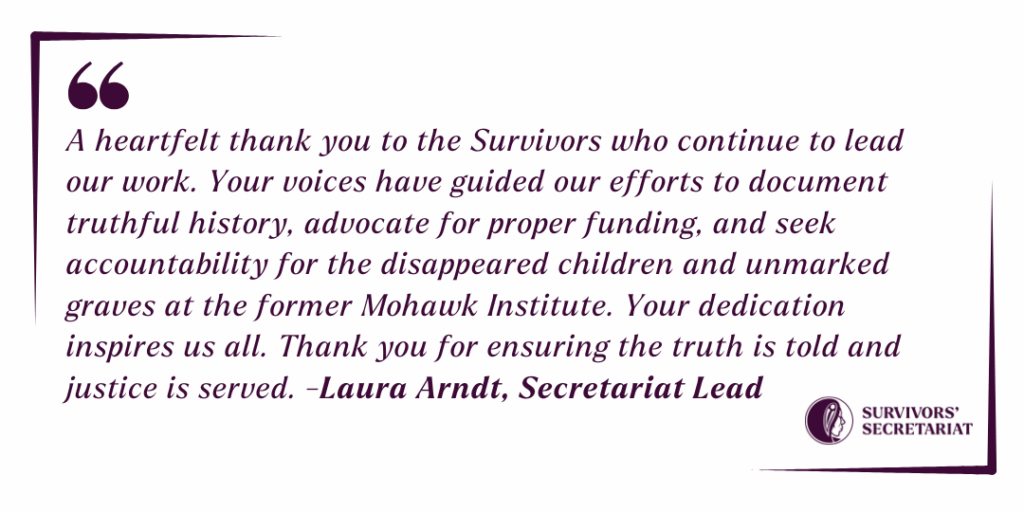
Over the past year, the Secretariat has engaged in a range of events and initiatives that bring together Survivors, Intergenerational Youth, and Community Leaders to share knowledge, reflect on lessons learned, and work towards Bringing Children Home.
The 2024–2025 fiscal year has been financially challenging for the Survivors’ Secretariat due to the absence of new federal funding. This is especially alarming considering 70% of our annual operating budget has been previously derived from federal funds.
As of May 2025, the Survivors’ Secretariat remains without federal funding, putting vital programs and ground search efforts at risk. While we have received funding from the province of Ontario, Heritage Canada, and the Law Foundation of Ontario, the ongoing uncertainty regarding federal funding has led us to pursue charitable status to secure additional resources.
Learn more about our funding challenges, read our latest blog post here.
Let’s look back on our year of accomplishment, challenges and change:
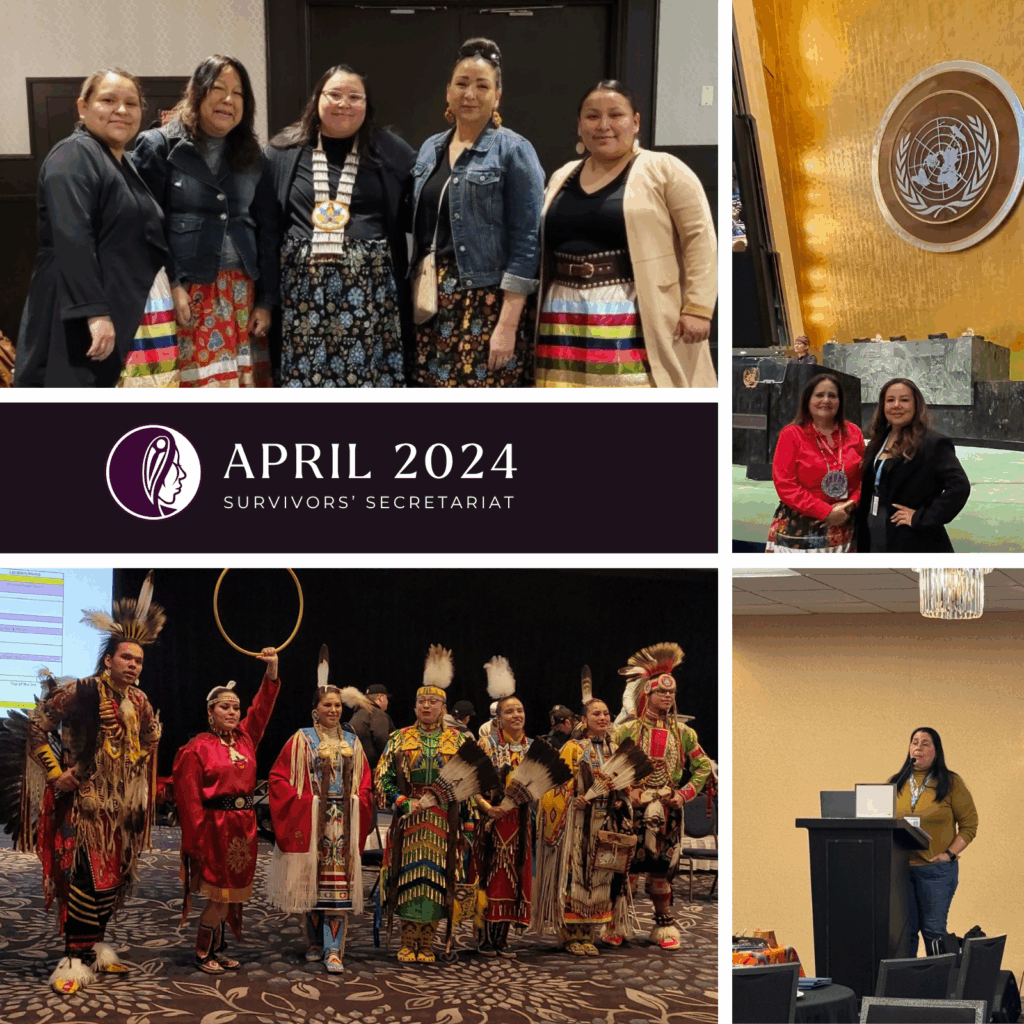
In April, the Survivors’ Secretariat was actively involved in several important initiatives. They attended the Residential School Site Search Forum in Thunder Bay, Ontario, where the ground search team shared strategies with other communities working to locate unmarked burials linked to Indian Residential Schools. The Survivors’ Secretariat Cultural & Spiritual Wellness team also participated in the Keway Anokikatamowin Mushkiki Kikedaziwin gathering in Edmonton, focused on preserving traditional medicine knowledge.
Dr. Beverley Jacobs, Human Rights Monitor and Abby Carpenter, System Navigator, represented the Secretariat at the UN Permanent Forum on Indigenous Issues in New York City; this trip was supported by the Law Foundation of Ontario. Preparations began for the 2024 Youth Ground Search season at the grounds associated with the Mohawk Institute.
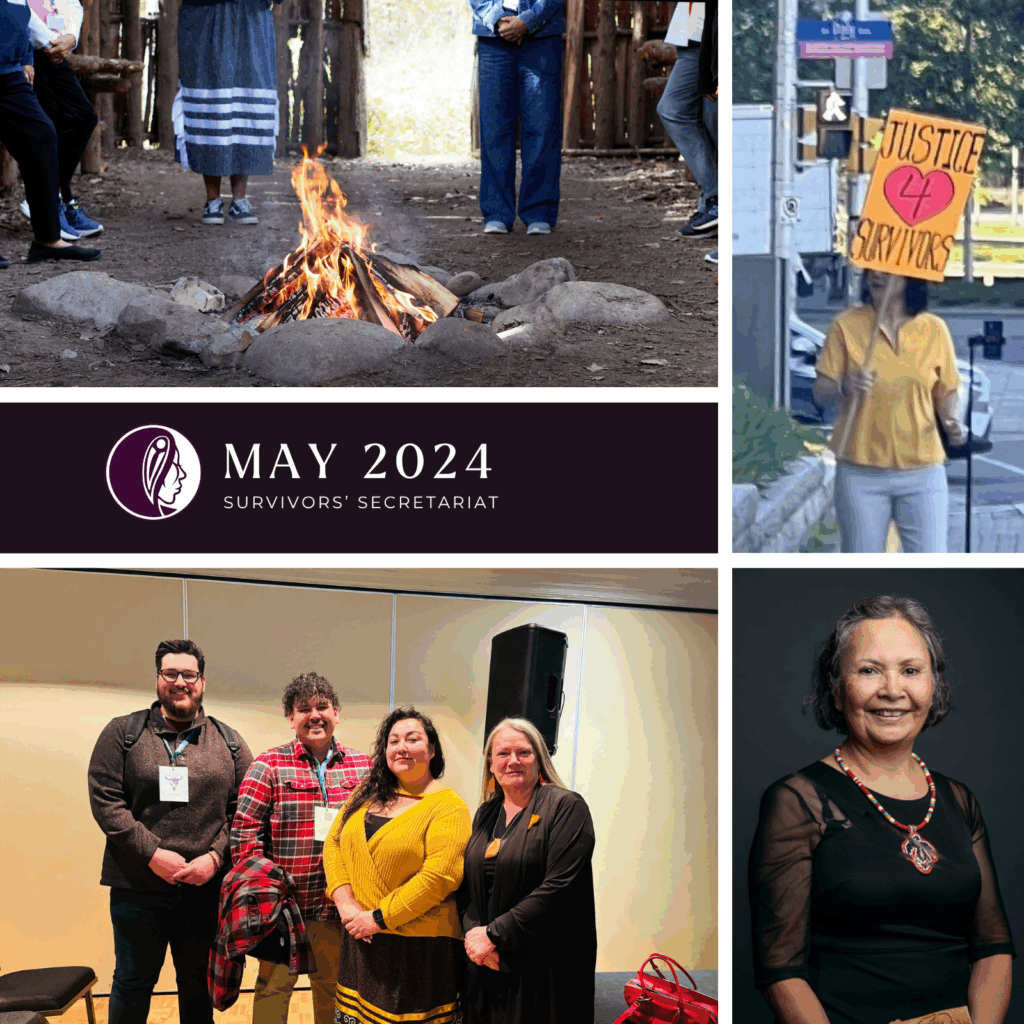
In May, the Secretariat took part in Six Nations Community Awareness Week, inviting the community to visit our office. A ceremony, led by Shelley Clarke and Tania Jonathan, the Secretariat’s Cultural Wellness staff, marked the beginning of the 2024 Ground Search season at the Mohawk Chapel. The Secretariat’s ground search team also attended the Canadian Archaeological Association gathering, which focused on the role of archaeology in connecting the past with the present.
The Youth Supporting Survivors Program (YSSP) held its orientation week, welcoming five new students and three returning ones. Filming for the Survivors’ Secretariat process documentary began, and staff participated in a training session with trauma and mental health expert Brenda Reynolds to further enhance our trauma-informed support efforts.
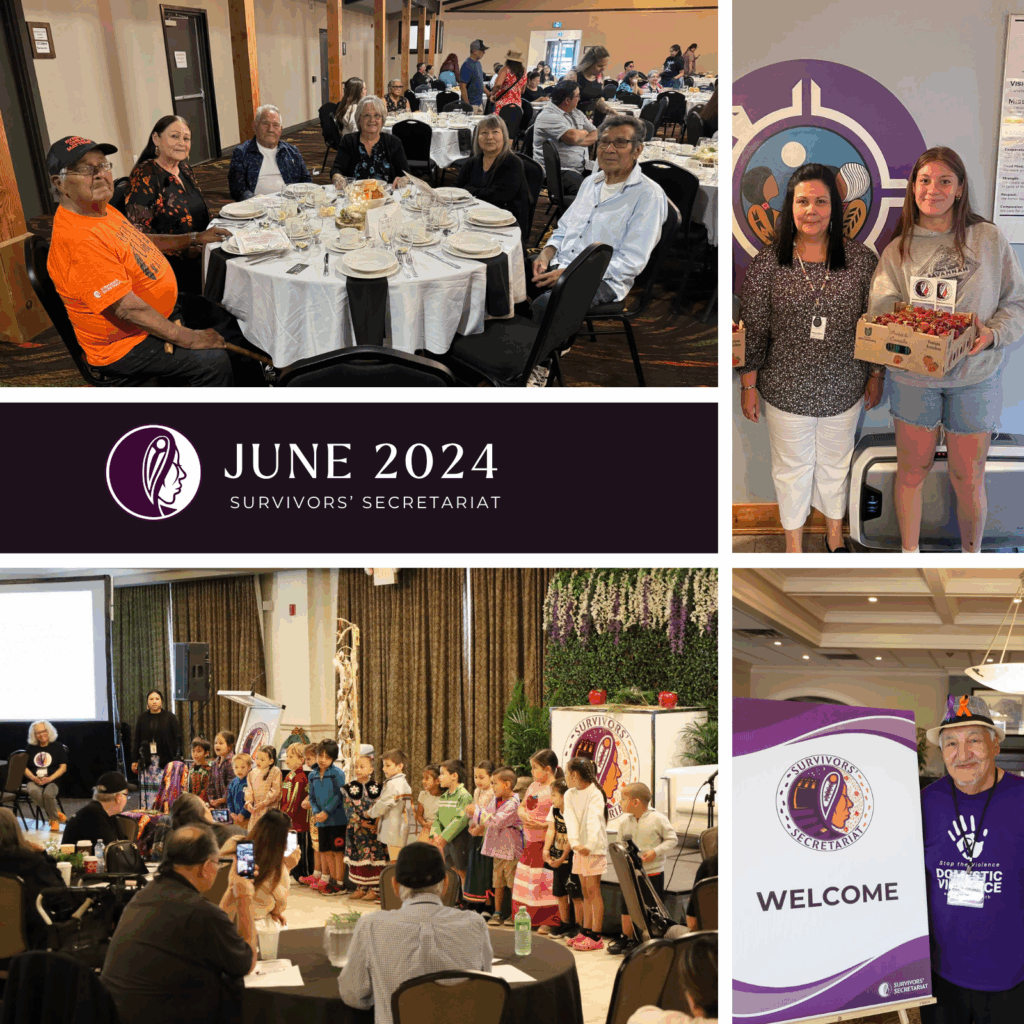
In June, the Secretariat attended the Indigenous History & Heritage Gathering in Ottawa, which focused on amplifying truthful Indigenous narratives. The Secretariat’s Youth Supporting Survivors team took part in a wellness day activity at Austin Farms and donated strawberries to local Six Nations organizations.
The Secretariat was involved in the National Advisory Commitee’s (NAC), National Knowledge Sharing Event on Residential Schools, Missing Children, and Unmarked Burials in Ottawa, where they highlighted their ongoing ground search initiatives. June also marked the Third Annual Survivors Gathering, one of the largest hosted by the Secretariat, bringing together Survivors, Intergenerational Survivors and their communities to share updates and reflect on the Secretariat’s work.
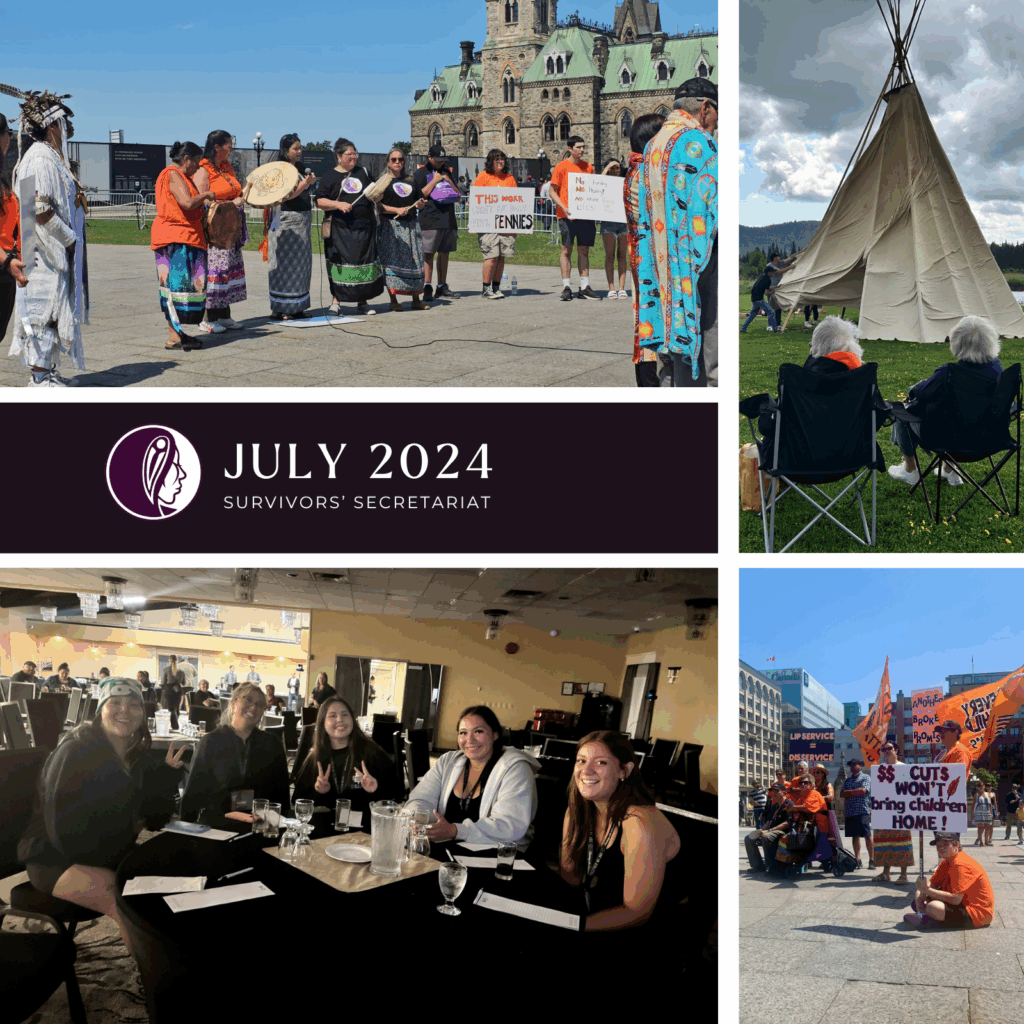
In July, the Survivors’ Secretariat participated in several events, including the Standing with Survivors Youth Gathering in Thunder Bay, where Survivors shared their experiences to help youth understand the trauma in Indigenous communities and encourage them to become knowledge carriers of the truth about Indian Residential Schools.
During this gathering, a significant development overshadowed the activities; the Canadian federal government announced a cap of $500,000 on funding for communities leading searches into unmarked burials, which would have led to a 70% reduction in the annual funding received by the Survivors’ Secretariat. In response to these drastic funding cuts the Secretariat, along with a bus full of supporters, traveled to Ottawa to oppose the funding caps. This trip was made possible through generous donations from local businesses.
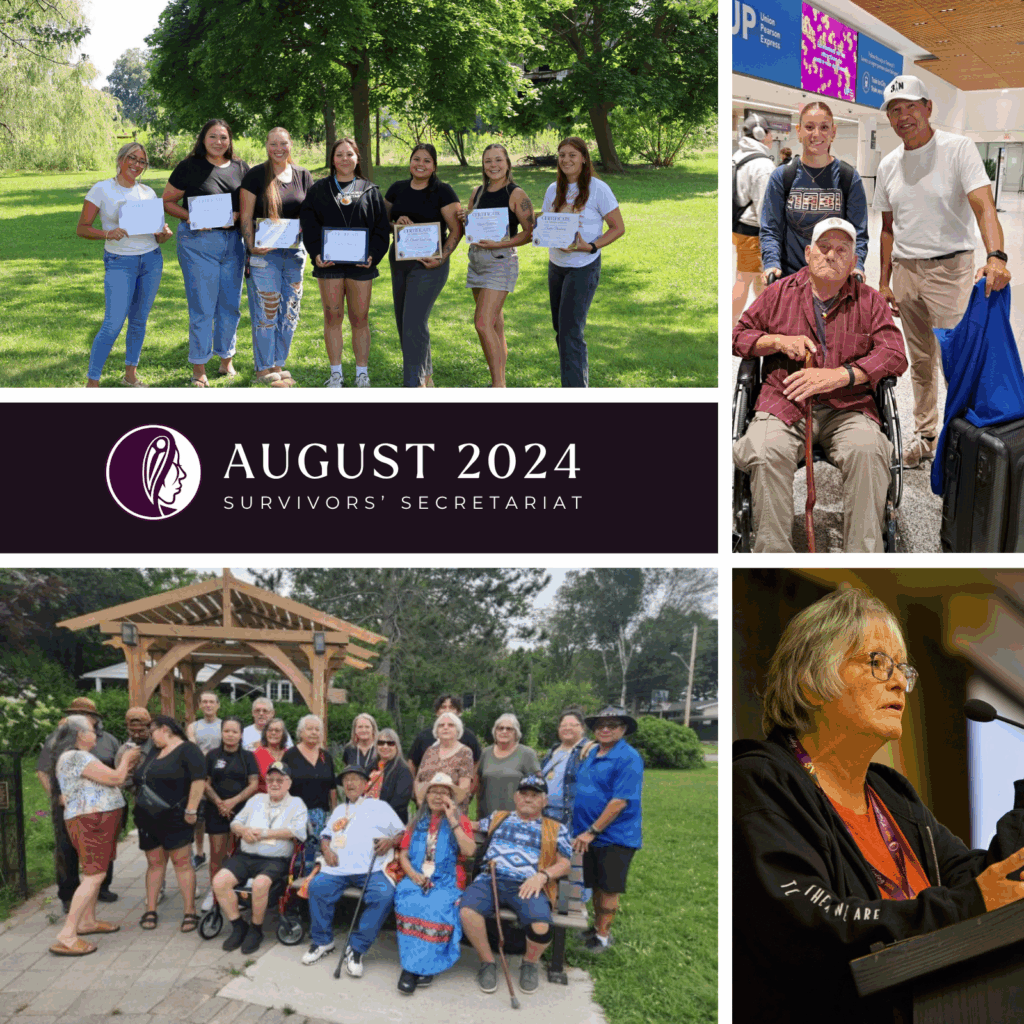
In August, the Survivors’ Secretariat attended the Ketegaunseebee Bring Our Children Home gathering in Sault Ste. Marie and traveled to Thunder Bay for the Knowledge is Sacred and Truth is Healing Survivors’ Gathering. The Canadian federal government lifted the $500,000 funding cap for Survivor organizations but did not allocate additional funds to the Residential Schools Missing Children Community Support Fund, resulting in an overall reduction of approximately $125.5 million in funding compared to previous years.
The 2024 Youth Supporting Survivors ground search team, which ended in late August, was recognized with Eagle Feathers for their commitment and dedication, with the feathers generously donated by African Lion Safari. The Secretariat also launched its Orange Shirt Day Fundraising campaign.
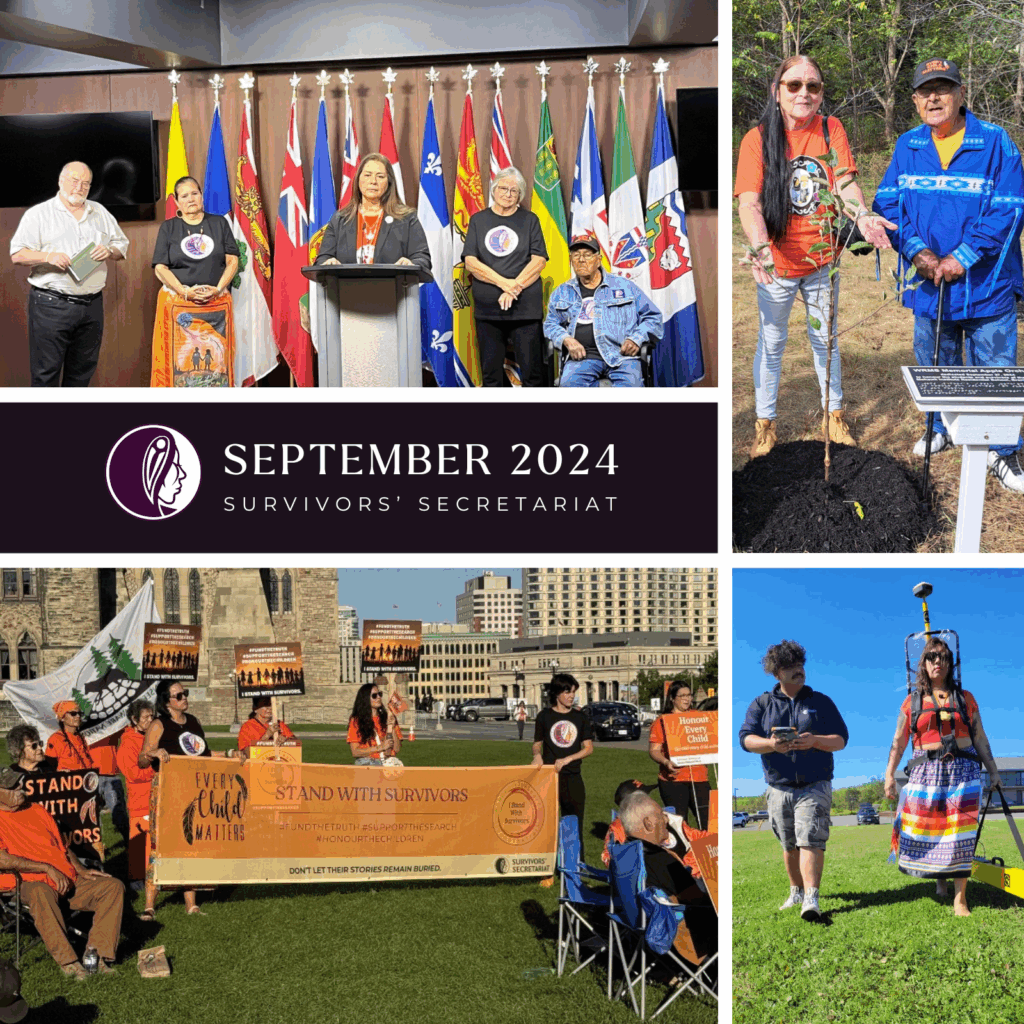
September was a month of reconciliation and advocacy. The Survivors’ Secretariat ground search team attended the Sacred Children Workshop in Thunder Bay, Ontario, where Indigenous communities and professionals came together to learn about ground search techniques and technology. The Secretariat’s Data Librarian and researcher, Mika Patterson, also delivered a presentation at the National Advisory Committee on Residential Schools Missing Children and Unmarked Burials gathering in Quebec, where she discussed the critical intersection of ground search efforts and archival research.
The Secretariat displayed 100 feathers on their front lawn to honour the children who died at the Mohawk Institute, marking a significant milestone in their document and research efforts. Survivors and Secretariat Staff also participated in several events for National Truth and Reconciliation Day, including a rally on Parliament Hill to address the recent funding cuts to missing children and unmarked burial investigations.
The Secretariat also supported community events such as the opening of the W. Ross Macdonald School for the Blind Apple Orchard Memorial and participated in a Truth and Reconciliation Event at Six Nations Polytechnic, sharing stories of resilience from Survivors.
The Survivors’ Secretariat Orange Shirt Day Fundraising campaign came to a close, selling over 3,000 Orange Shirts! A special thank you to everyone who participated, we are deeply appreciative of your support.
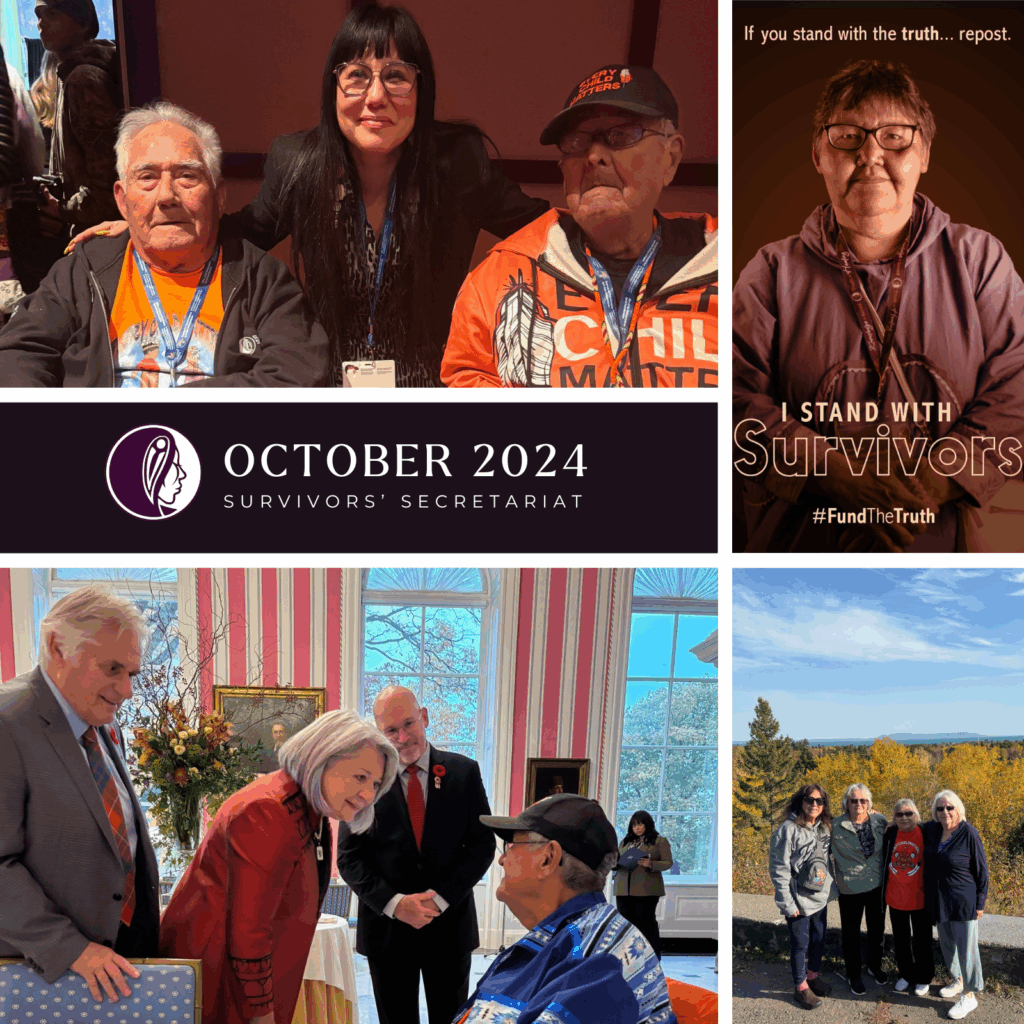
In October, the Survivors’ Secretariat ground search team attended the Indian Residential School Research and Recovery Methodologies Knowledge Exchange in Thunder Bay, hosted by the Anishinabek Nation. The event focused on knowledge exchange for ground search related to investigations into unmarked burials. The Secretariat also launched the “I Stand with Survivors” campaign on social media, advocating for adequate and long-term funding to support the vital work of Bringing the Children Home.
The Independent Special Interlocutor released a final report on missing Indigenous children and unmarked graves, highlighting the legal and moral obligations to support investigations into unmarked burials at Indian Residential Schools.

November was marked by several events, including participation in wellness gatherings and continued advocacy work. Mark Pritchard, Survivors’ Secretariat Investigative Lead, spoke at the Indigenous Awareness Symposium, sharing his insights on investigations into missing children from the Mohawk Institute. Survivors’ Secretariat Lead, Laura Arndt, also spoke at the Cristal Lake Residential School Initiative, reaffirming the importance of linking records and data collection with ground search activities.
Diane Hill, a Survivor of the Mohawk Institute, attended Akwesasne’s We Are Still Here wellness gathering, while Survivor Sherlene Bomberry and Survivors’ Secretariat Wellness staff member Shelley Clark attended the Anakay Meekwewin: You Are the Medicine gathering in Thunder Bay, Ontario. The Secretariat held its 2023-2024 fiscal year Annual General Meeting at the Six Nations Community Hall.
Survivors’ Secretariat also concluded its physical search at the grounds associated with the Mohawk Institute for the 2024 season, and a traditional ceremony was held to honour the children in a good way. The Survivors’ Secretariat board and staff participated in the Six Nations Annual Christmas Parade, distributing information packages to attendees.
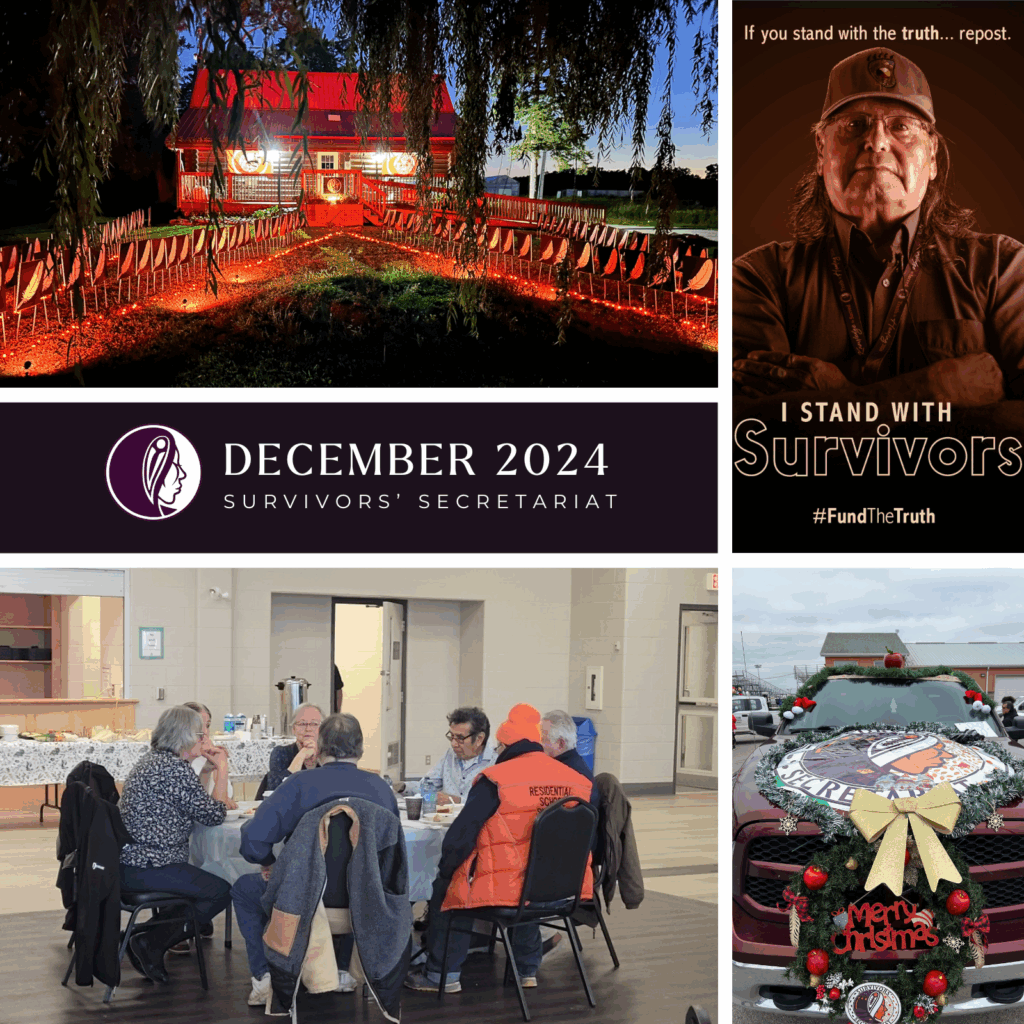
December concluded the year with community-building activities, including a staff potluck and Christmas party. However, the month was also marked by a critical announcement that the Survivors’ Secretariat would face insolvency due to the federal government’s failure to release necessary funds for the 2024–2025 fiscal year. This created significant uncertainty about the Secretariat’s future efforts to continue the work Survivors started, to Uncover, Share and Document the truth of the Mohawk Institute in its 140+ years of operation.
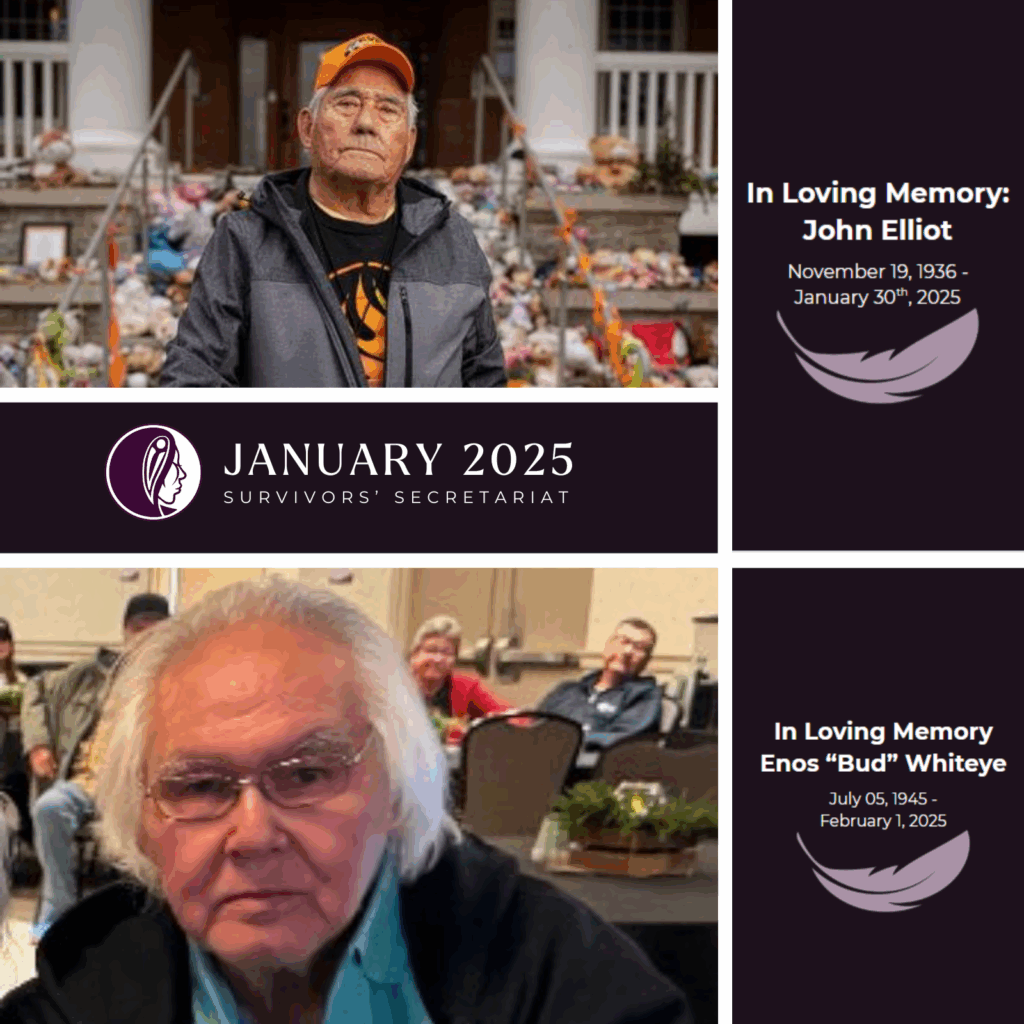
As the 2025 year began, the Survivors’ Secretariat continued to face significant challenges regarding funding. In January, they received a letter from CIRNAC (Crown Indigenous Relations and Northern Affairs Canada) stating that they would receive $0 in funding for the 2024-2025 fiscal year.
CIRNAC claimed the Secretariat had a $4.1 million surplus, which included $2.5 million carried forward from the previous fiscal year and “disallowed expenses” deemed ineligible by CIRNAC. Despite submitting several financial reports and three audits over the years, with no issues raised, these expenses were now being questioned.
In January, our hearts grieved the loss of two beloved members of our Secretariat family, Survivors John Elliot and Bud Whiteye, who passed away within days of each other. Over the coming year, we will honour their memory, along with the lives of the Survivors who also passed in 2024.
Throughout the month, the Survivors’ Secretariat Wellness Team made in-person visits with Survivors at Iroquois Lodge to offer wellness support and connection.

In February, the Survivors’ Secretariat participated in multiple media interviews, where Laura Arndt discussed the organization’s priorities for 2025 and funding setbacks for the 2024-2025 fiscal year. Laura emphasized the importance of ensuring the full truth is told and urged leaders at all levels – federal, provincial, municipal, and First Nations to support and advocate for the continuation of this vital work. The Wellness Team also attended a human trafficking awareness event at The Gathering Place in Ohsweken, demonstrating their commitment to broader issues impacting their communities. The Secretariat also sought new Board Members for the 2025-2028 term to help guide and support its ongoing efforts.
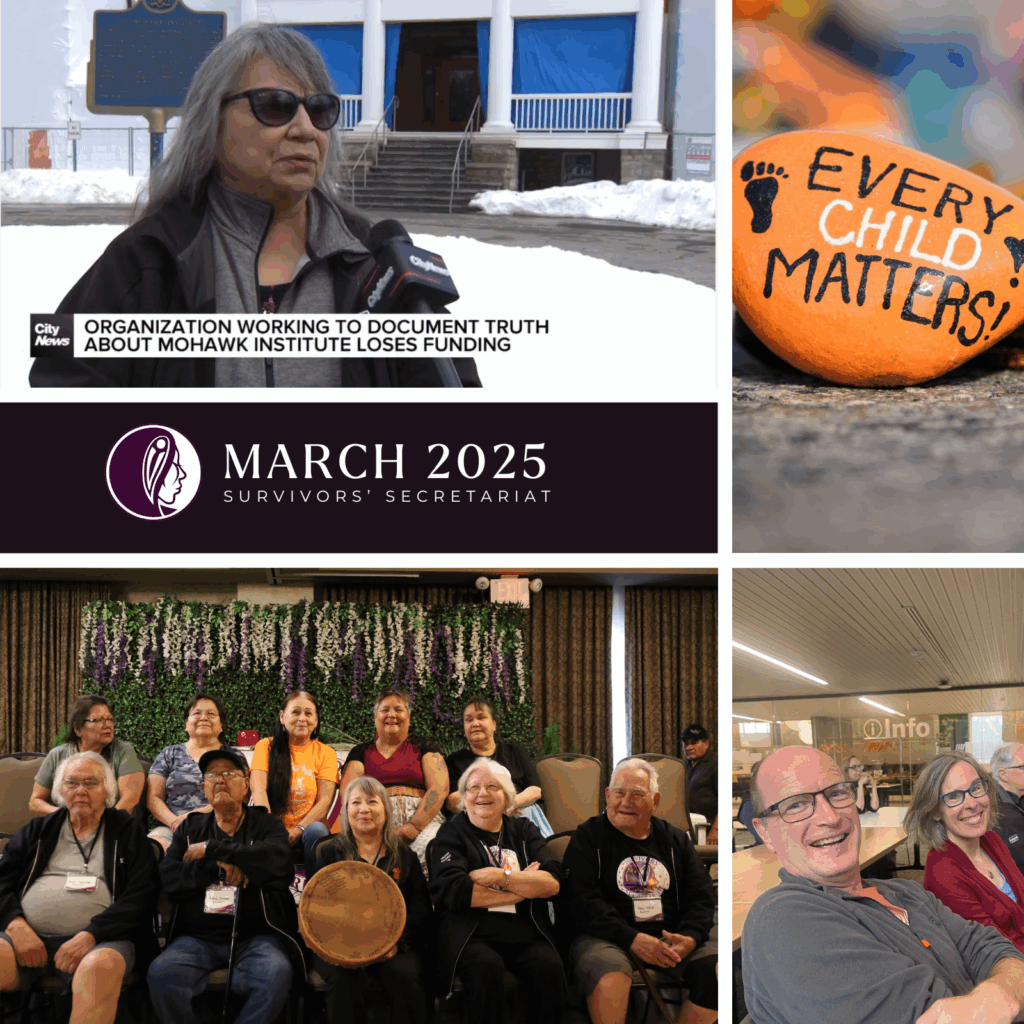
In March, the final month of the fiscal year, the Survivors’ Secretariat appointed new Board Members for the 2025-2028 term, welcoming Alfred Lonnie Johnson, Leo Nicholas both Survivors of the Mohawk Institute, and Intergenerational Survivor, Kathy Mair. Welcome to the team!
The ground search team from the Survivors’ Secretariat attended the Mapping and Memory Workshop at Western University. Hosted by the university, the workshop included valuable sessions on methodologies for community and Survivor-informed mapping. The team collaborated with Dr. Lisa Hodgetts and Edward Eastaugh to explore how documents, records, and oral histories can be integrated into archaeological work. We are grateful for the opportunity to connect, learn, and contribute to the ongoing work that centres Survivor voices in both archaeological and historical research.
Earlier this month, the Survivors’ Secretariat continued its collaborative partnership with the Chief Coroner of Ontario. An initial meeting in North York, followed by a session at the Secretariat’s office, allowed both teams to align on priorities and share information about deaths at the Mohawk Institute. Regular information sharing was established with researcher Jordy Schmutz, and early insights have already emerged. The partnership remains ongoing, with further investigative support from Mark Pritchard.
Also in March, in response to CIRNAC’s claim of a $4.1 million surplus, the Secretariat requested a detailed accounting of disallowed expenses and followed up for over a month but received no response. To continue its operations despite limited resources, the Secretariat released several staff members and eliminated most contracted service agreements, resulting in a smaller, focused team. However, with no funding provided by the federal government for the 2024-2025 fiscal year, the Secretariat will be unable to field a summer ground search team for the 2025-2026 season.
Survivors’ Secretariat board member Roberta Hill, also a Survivor of the Mohawk Institute, emphasized that the government’s reluctance to fund projects like the Secretariat’s, is a way to sweep the truth of Canada’s history under the rug.
Although the Secretariat has made significant strides this year, we have faced considerable financial challenges. Despite these obstacles, we are deeply grateful to the individuals and organizations whose unwavering support has carried us through to the end of the fiscal year.
To the Survivors who have bravely shared their truths, to the staff whose dedication has fueled our work behind the scenes, and to our contract partners who have stood by us in solidarity, thank you for your vital contributions. Your commitment has been instrumental in driving this work forward.
Looking ahead, we remain steadfast in our commitment to Uncover, Document, and Share the full truth of the Mohawk Institute. With your continued support we will build on the progress we’ve made and push forward with even greater determination on our path of truth, justice, healing and reconciliation.
In addition to our Wellness Team, the Secretariat would like to extend a heartfelt thank you to the wellness supports that have worked with the Secretariat throughout the year including: the Six Nations mental health team, and Crisis Hub, Indigenous Primary Health Care Council (IPHCC), Brantford Regional Indigenous Support Centre (BRISC), and mental health consultant Brenda Reynolds. Your commitment to supporting Survivors, their families, and communities with care, and guidance has been deeply appreciated as they continue their healing journeys.
